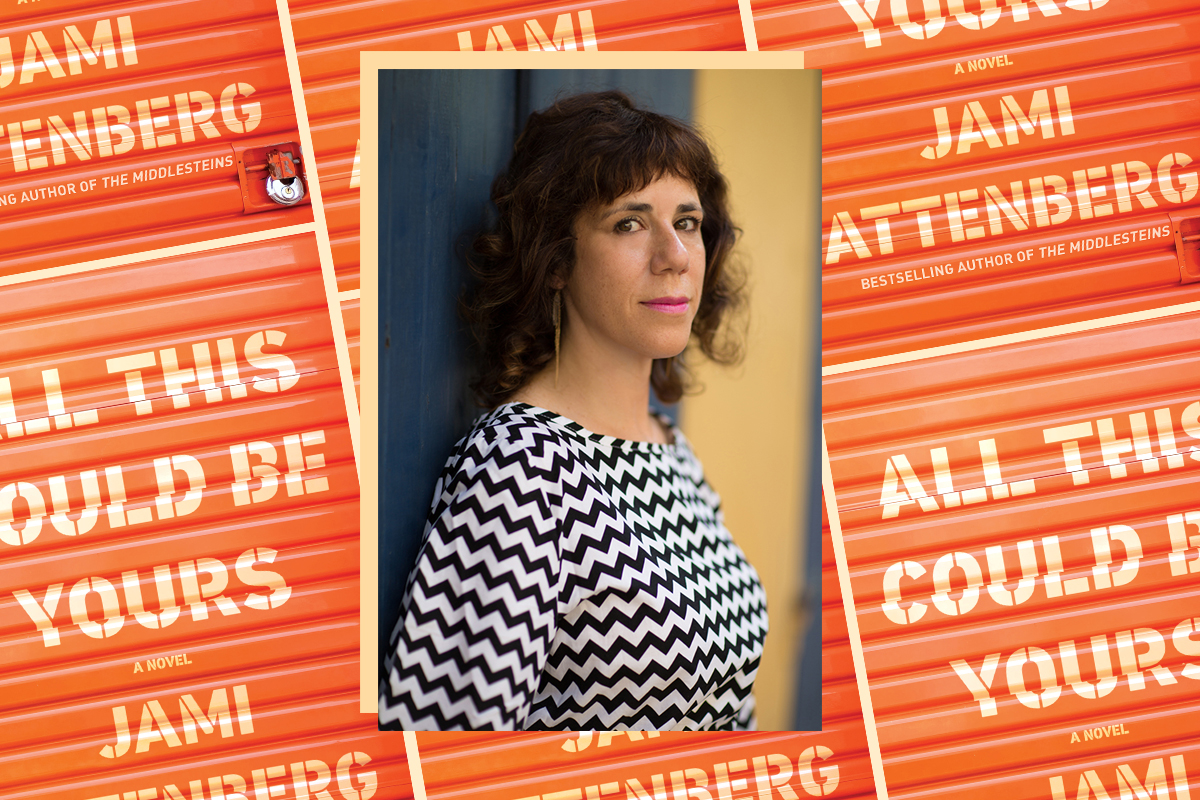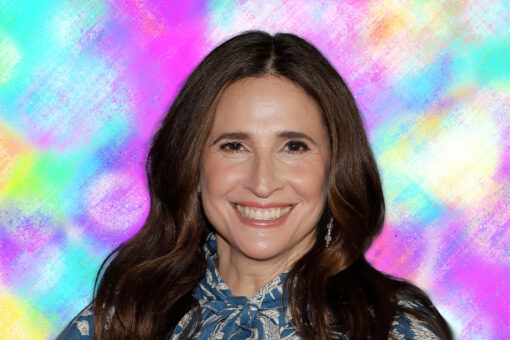Jami Attenberg’s seventh novel, All This Could Be Yours, tells the story of the Tuchmans. It’s not really a spoiler to tell you the patriarch, Victor, dies at the start of the novel, and the rest of the tale follows the Tuchmans as they learn of the news and gather in New Orleans.
The “poet laureate of difficult families,” Attenberg’s previous novels have tackled subjects like adulthood without children, food addiction, and even a dip into the Jazz age. And found in many of these books are characters whose Jewishness, while not always at the forefront, adds a layer to their identity that resonates with many Jewish readers.
All This Could Be Yours was one of our favorite books for fall 2019, and we had the chance to chat with Jami about All This Could Be Yours, the lead up to publication, and the joys and horrors of Twitter.
Why did you choose to set the story over one very long day?
I think that having something with a time constraint to it lends itself to the urgency of the storytelling, so you always knew you were returning to that moment. It’s kind of fun and interesting to the reader.
I love at the end how it flashes forward. Did you know you were going to write up to that?
I thought it was really going to be one day. And for the stuff that happens before and the stuff that happens after, that came after the fact, after I had written the core story. Basically what happened throughout the book is all these characters popped up and insisted on talking more. Not just the kids, but the people who work in New Orleans, in the service industry and elsewhere. Victor’s voice in the first chapter was not part of the original draft. There was just a lot of people who said, “Well, that’s nice that you tried to write it that way, but we in fact need to be part of this book, too.”
What about the setting of New Orleans? I have never actually been there, but it felt like I had while reading. Why did you chose to set the story there?
Well, I moved here! I lived in New York for a long time, then I moved here in 2016 full-time. I had spent several winters here before that. This is my first book set here — everything else has been set in New York or the Midwest. I really kind of danced around writing a book set here for a while, because I wanted to get to know the city better. People who live here are really protective of New Orleans in a way unlike anywhere I’ve lived before. And I say that as a compliment; people are protective of New York, but New York is so big that it means a lot to a lot of different kinds of people. This is a really small city, has such a strong history, and it’s a really tight community, so I had to figure out how to write about the city. But I really wanted to, it was really important to me.
So how did you figure out how to set this one in New Orleans?
The way in for me was to write about it from an outsider’s perspective. And to just be myself — I mean, be myself as a writer, so write about the things that I am good at writing about. And then let things sort of roll from there.
I loved the review that called you “poet laureate of difficult families.”
I mean forever, on my grave, it’s fine, I can die now!
I was about to ask, I don’t know if you read reviews, how did you feel when you read that?
I read that one! I tend to read the pre-pub reviews because usually they can set the tone for the rest of the reviews, so I was interested to see what reviewers were drawn to in the book, and what the narrative about the book is going to be.
So, I really loved that review. That whole review, was to me, just extremely thoughtful and really well-written, which you don’t necessarily always get in a pre-pub review, because you don’t know who is writing them. Not to slam pre-pub reviews, because they’re really important. And they read everything! Which is a ton of work. But, I thought there was a great care that was given to it. I was really thrilled [about] the conversation about the book, and I’m thrilled that people seem to be getting something out of it.
How does the lead up to the publication feel?
This is my seventh book. The first book feels different than your third book, which feels different than your seventh book. So, I’m happy that reviews have been good so far, there’s no guarantees on anything. It’s a really tough fall — it’s a really crowded fall, there are just so many amazing books out there this fall. I guess I want to do a really good job of promoting the book. One thing I’ve learned is you can control absolutely nothing. When it comes to publishing, you can only write the best book you can write, and hope that everybody is open to it, you know? Open to considering it.
I have a really wonderful publisher and the team there is really supportive. This is my second book that I’ve done with them and the fourth book I’ve done with my editor. So, we know each other. I don’t know! I love this book, I think it’s my — I know that it’s my favorite book that I’ve ever written. I just hope people get something out of it. I definitely was trying to communicate with the world.
Definitely.
Which sounds corny. That’s one of those things where I’m like, what did I just say?
Not at all, I don’t think it sounds corny at all! Going off of what you were trying to communicate — I felt like the book goes into the complexities of grieving and death. Are you someone who appreciates the Jewish guidelines for death? Or do you think of grief more on your own terms? Does your attitude towards grief shape the story at all?
I don’t know if I have an answer for that question. The Tuchmans don’t practice Judaism, yet they do sit shiva. So it means something to them, it’s important to them, and they do feel like very Jewish characters to me.
Grieving is universal. I’ve already had people who have read the book who are not Jewish, but were struck by talking about grief, and thinking about grief, wanting to have that conversation with me about it. It’s never about being of any particular faith. It’s a universal thing, losing people that you care about, or that you don’t care about but you still have to contend with those feelings.
How do you decide whether or not to bring Jewishness to the forefront of the story?
I lean into it, but I don’t do it very consciously, at times. I would say that when I’m writing a family story, I’m probably more likely to lean into [Jewishness].
Because if I look at Saint Maize, she’s Jewish, but she’s very fascinated with the Catholic faith, as the real Maize was in real life. And Andrew in All Grown Up is culturally Jewish but not somebody who practices. And [in All This Could Be Yours] the Tuchmans don’t practice. There’s something about a family narrative and Judaism… the family narrative heightens that intersection for some reason. If you know why, let me know! I don’t know why.
Write what you know? I have no clue, I’m not the novelist here!
I don’t think about it that much, I just write it and see what happens. If I was consciously writing a book and [thought] these characters are gonna be super Jewish, I just wouldn’t write that book. I’m character driven. I’m not so strategic in that way. I would say their background is a part of them; to me, it’s the same as the books that are on my bookshelf, and their sexual desires and what they like to eat for lunch. It’s a defining characteristic. It’s one of many.
Just switching gears away from the book — I’ve seen your “1,000 words of summer” exercise on Twitter, where you encourage people to write 1000 words each day for two weeks.
Did you do it?
No, I did not. I was intimidated by it!
Someday I am going to get an interviewer who has and it’s gonna be really fun.
How did you start that?
A friend and I were talking about doing it together. She’s a teacher, and she’s a writer, so she has more time in the summer. And I was like, “Let’s do it, let’s do it this summer!” And then I tweeted about it, and posted something on Instagram, and immediately, all these people [responded]: Yes, I want to do it.
It’s one of those things where if I had planned it, it never would have happened. Because I am not interested in planning too much. I am interested in things organically developing in my writing, and in any kind of community connection, community work, that I’m doing. If you try to do things and have it be too planned out, or too strategic, then it doesn’t work for me. It doesn’t feel sincere, it doesn’t feel intuitive. It just has to feel natural to me. Next year, I’m going to do it again [for the] third year. It might be the last year, next year, I don’t know. It’s a lot of work, but I do think people get a lot out of it, and I’m happy to support other writers. I know some people who finished books, and have gotten book deals off of it, so that’s been really nice. I feel like those are like my little babies!
It’s also a way of reclaiming the internet. Because it can get so dark and depressing, bad news can be ceaseless, and often people can be critical of other people on it. For the couple weeks that we’re all working on it together — however many thousand people are doing it — it feels like we’re all talking about the same thing at the same time. It’s something really positive.
What has your relationship been like with Twitter? Obviously you started this wonderful exercise for people, but Twitter can be a hard place to be.
If I could get off it, I would. But I don’t think, professionally, I can get off it. I get work off Twitter. I don’t even know how many of [my] last essay assignments I’ve gotten off a tweet or an Instagram post. If I look back at it, seriously every single time it’s because I tweet something, and then an editor says, “Will you write about that?” It’s quite useful in that way for me. I do have a community there, and I really would miss those people if I wasn’t seeing how they were doing. And obviously I’m in New Orleans! In New York, I had more access to people, but now I’m in New Orleans, and most of my friends [here] are not on Twitter – like I have a whole other life that has nothing to do with the internet. But it does help me to remain connected to people. I don’t know, it can be a real shit show! It’s modern life, baby!
What’s on your nightstand right now?
I’m re-reading Just Kids, and I’m re-reading this book of poetry, Absolute Solitude, by this now-deceased Cuban writer [Dulce María Loynaz]. That’s a really wonderful book that I read while I was writing this book, and I felt like it would be good for me to revisit it because I got so much out of it. And there’s so much conversation about loneliness in the book, and this book finds the beauty in loneliness, which I am a fan of. And I’m reading this Liz Moore book that’s coming out next year; it’s really good, it’s a literary cop novel that’s about the opioid crisis in Philadelphia. Those are the ones occupying my mind right now.
All This Could Be Yours is out October 22. Image of Jami Attenberg in header by Zack Smith.



